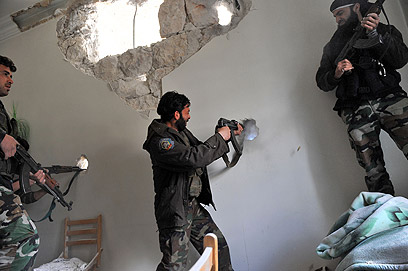
Analysis: Arab states at crossroads
Al-Quds University professor says when the Americans feel there should be peace in the Middle East, 'they will impose it in any way, shape or color that they want'
When revolutions broke out one after the other in Tunisia, Egypt, Libya and Syria more than two years ago, there was a feeling that things in the Middle East were dramatically shifting. The impetus for what was dubbed the “Arab spring” seemed to be a sincere impulse by millions of people to throw off authoritarian rulers and move towards democracy.
But in all of these countries, especially Egypt and Syria, the move towards democracy has been far from simple. In Syria, President Bashar Assad has managed to hang on, and in recent weeks, even take back some territory he had lost, far longer than most people had predicted.
Related stories:
- Op-ed: Arab Spring myth exposed
- Jordan: Arab Spring increased Israel's isolation
- Op-ed: Arab Spring's side effects
Moshe Ma’oz, an Israeli expert on Syria, says Assad, a member of Syria’s Alawite minority, seems to be hanging on, despite Israeli intelligence predictions that his regime was nearing its end.
“Right now there is some kind of status quo between Assad and the rebels,” he told The Media Line. “I might even say that the balance of power is in favor of the regime because the army of 300,000 people is still loyal to him. He also has the support of the middle class, even those who are Muslim and Christian.”
Part of the problem, he says, is that the rebel opposition has not been able to unite, and the international community has been hesitant to intervene. But eventually, he says, Assad will fall, and there could be chaos in an area that is crucial for both Israel and Turkey, which has a 700-mile border with Syria.
“Both Israel and Turkey should support the same thing – a mainstream Islamic regime,” Maoz says. “The alternative is worse because that means al-Qaeda, Salafis, or Jihadists.”
The death toll in Syria is mounting daily, and there seems to be no end in sight. More than one million Syrians have fled the country, and another two million have fled their homes to other parts of the country. Recent air strikes attributed to Israel increased tension in the area, although Israeli officials said they do not believe Al-Assad wants to open another front against Israel, they are concerned that he could be transferring high-tech weapons to Hezbollah guerillas in south Lebanon and Israel has stepped up its alert.
When it comes to Israel’s southern neighbor, Egypt, the situation is radically different. Long-time autocrat Hosni Mubarak stepped down after massive peaceful protests and Mohamed Morsi was elected in a democratic vote.
“The main achievement is that people feel they can protest and they no longer have a fear of authority,” Maye Kassem, a professor of political science at the American University of Cairo told The Media Line.
Yet the optimism that Egypt’s transition to democracy would be smooth has dissipated as Egypt faces a growing economic crisis.
“People feel their standard of living has deteriorated,” Kassem said. “Even access to water and electricity - they can be cut off, often for days on end. People are not willing to buy more than the basic necessities because they want to keep their money close to them.”
Personal security has also gone down, as crime and sexual harassment of women has gone up. Tourism is down significantly.
Egypt has been negotiating with the International Monetary Fund (IMF) for a $4.8 billion loan, but has so far been unable to close the deal. Foreign investment is down, and the international community seems unsure that Morsi will be able to maintain the financial reforms that the IMF is demanding.
One place where the Arab spring revolution hasn’t taken hold is, perhaps ironically, in the West Bank and Gaza Strip. The Palestinians have been struggling for an independent state well before the Arab spring began. In 1987, the first intifada, or uprising against Israel, began and in 2000, the more violent, second intifada.
It would be logical that Palestinians, inspired by the Arab spring, would have launched a new uprising against Israel. But they have been preoccupied with other issues including the rift between Fatah, which controls the West Bank, and Hamas, which controls Gaza.
The Obama Administration is currently trying to restart peace talks between Israel and the Palestinians, with a new effort spearheaded by US Secretary of State John Kerry. But some Palestinian analysts say that without intensive US involvement there won’t be peace.
“Neither the Palestinian nor the Israelis are the players in this game – the grand masters are the Americans,” Munther Dajani, a professor of political science at Al-Quds University told The Media Line. “When the Americans feel there should be peace here, they will impose it in any way, shape or color that they want.”
Looking at the broader Middle East, Dajani says it is too early to see the final results.
“The Arab spring is a mass movement which is sweeping the Arab countries one by one,” he said. “It will take a few years for it to be over. I don’t think anybody can evaluate if it is positive or negative because we haven’t seen the end of it.”
Article written by Linda Gradstein
Reprinted with permission from The Media Line
- Receive Ynetnews updates directly to your desktop












